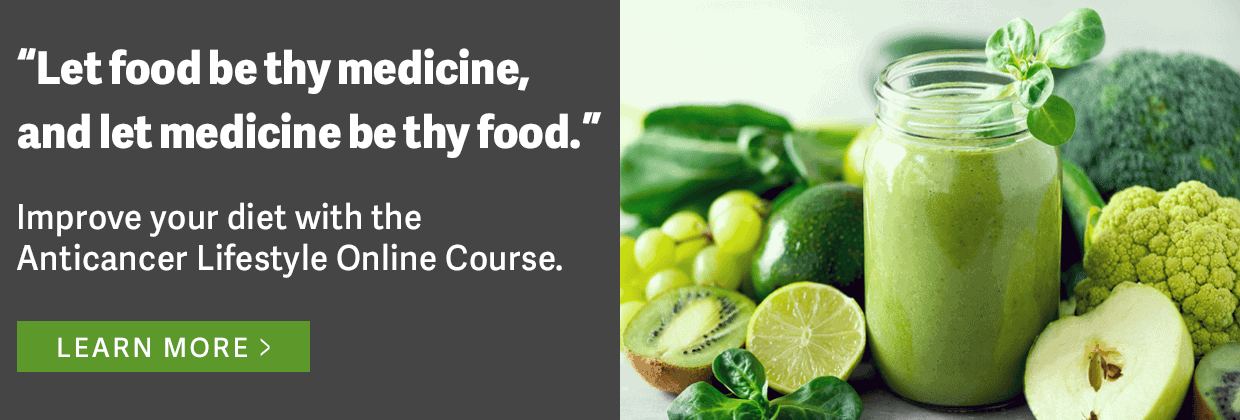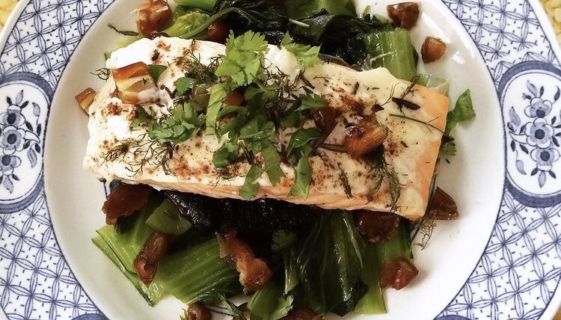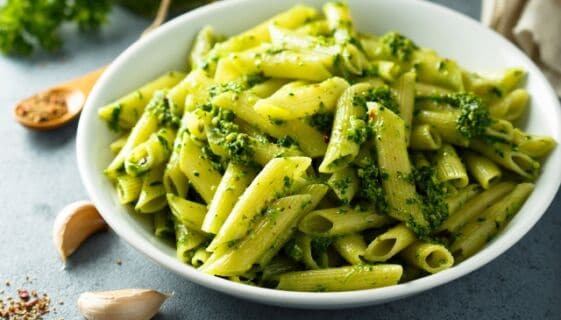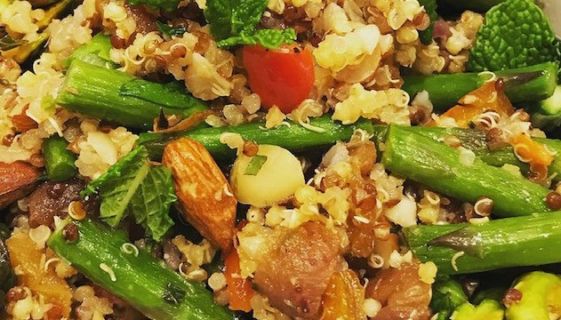If you are searching for a comforting, seasonal, creamy, healthy and delicious dish, look no further!
This Cauliflower Alfredo recipe delivers big on taste and decadence, while providing our bodies with a powerhouse of anticancer properties. It is a fun, lighter and creative play of a classic pasta dish that utilizes cauliflower as the base in place of the traditional cream.
As a member of the nutritional powerhouse cruciferous vegetable family, cauliflower can help minimize the odds of cancer and cancer recurrence, lower inflammation, and feed our gut. As an added bonus, the high fiber content helps our body feel more content after eating. To amplify the rich flavor, along with the anti-inflammatory properties of this sauce, the cauliflower is blended with roasted garlic. Roasting the garlic at high temperature caramelizes the plant sugars, creating a sweeter, richer flavor and allowing more powerful anti-inflammatory compounds to form. This dish also combines an array of colors and textures from the peas, broccoli and sweet potatoes that are not only aesthetically pleasing and enjoyable to consume but also provides numerous health-supporting phytochemicals. The balancing of all these flavors creates a lively and enticing dish that lets our body know how much we appreciate it.
INGREDIENTS
Base:
- 1 box of brown rice pasta (Jovial is my favorite brand) OR 1 large spaghetti squash*
- 2 tablespoons olive oil
- ½ teaspoon salt
- 2 cups frozen peas, thawed
Alfredo Sauce:
- 1 head of cauliflower, chopped and boiled
- 1 bulb of garlic, roasted (you can purchase roasted garlic in a glass jar and use 2 tablespoons)
- 1 cup of milk of choice
- ½ cup parmigiana or nutritional yeast (or combo of both)
- 1 shallot, pealed
- ½ lemon juiced and zested
- Salt and pepper to taste
Roasted Broccoli & Sweet Potatoes:
- 1 head of broccoli, stems sliced, and crowns cut into medium florets
- 1 medium sweet potato, diced
- 2-3 tablespoons oil (avocado or coconut)
- Salt
DIRECTIONS
- IF USING SQUASH: Pre-heat oven to 425-degrees, bake squash for one hour or until tender. Allow to cool for ten minutes. Cut squash in half and scrape out seeds. Fluff the interior with a fork to make the insides spaghetti-like.
- Soak frozen peas in hot water to thaw for 5 minutes, drain and set aside.
- Peel the outer parts of the garlic bulb, exposing the garlic cloves. Cut the top of the garlic bulb, making sure you cut off a bit of each clove around the bulb. Place in an oven safe saucepan and drizzle with oil, cover and place in the oven. Allow garlic to roast for 45 minutes.
- Prepare the broccoli and sweet potato. Mix them in a large bowl with oil and sprinkle with salt. Place the broccoli and sweet potato on a sheet pan in a single layer. Place in the 425-degree oven and roast for 30 minutes, tossing vegetables once halfway.
- Sweet potatoes will be fork tender and the broccoli will be nice and crisp.
- While the garlic and vegetables are roasting, boil the cauliflower until tender. Approximately 10-15 minutes.
- Remove cauliflower from water (we will use this same water to boil the pasta, if using). Place cauliflower in a blender. Add remaining Alfredo sauce ingredients and blend until smooth.
- If using pasta instead of spaghetti squash, boil pasta according to box in cauliflower water, drain
- Place squash or pasta in a large bowl and combine with olive oil, salt and peas.
- Add Alfredo sauce to pasta and gently mix to coat all the squash or pasta.
- Portion squash or pasta into a bowl and top with the roasted broccoli and sweet potatoes.
- Garnish with lemon zest and fresh basil.
NUTRIENTS
Broccoli: A member of the Cruciferous family of vegetables, broccoli produces a compound called sulforaphane that has been shown to reduce tumor growth and cause cancer cells to self-destruct. It also boosts detoxifying enzymes and acts as an antioxidant, reducing oxidative stress as well as stabilizing blood sugar levels by protecting cells from high-sugar environments. The sulforaphane also aids in digestion by keeping the stomach lining healthy and the bacteria balanced. It has also been shown to reduce inflammation and block the enzyme that causes joint destruction.
Cauliflower: A member of the Cruciferous family of vegetables, cauliflower provides a good source of dietary fiber, thiamin, riboflavin, pantothenic acid, niacin, Vitamin B-6, Vitamin C, and Vitamin K. Cauliflower is also rich in anti-inflammatory properties from phytochemicals (carotenoids, polyphenols, flavonoids, and ascorbic acid), and gut health promoting properties, due to it being a prebiotic (food for our good gut bacteria). This is one of the most nutrient-dense foods, with only 25 calories per cup, and packed full of immune- and health-supporting vitamins and minerals.
Green Peas: Peas are technically a legume, not a vegetable. What makes them unique is their high plant-based protein content as well as high amounts of fiber that aids our digestion. Their high fiber and protein content can play a role in maintaining desirable blood sugar levels.
Garlic and Shallot: These vegetables are amazing pre-biotics, meaning they feed the “good” bacteria in our gut and promote a healthy digestive system. Research supports that compounds such as allicin in garlic and shallots have antioxidant, anti-inflammatory, antimicrobial, and cardio-protective properties.
Sweet Potato: Packed full of beta-carotene (a precursor to vitamin A). Vitamin A is integral for vision and immune function, as well as skin and bone health. Beta-carotene is a powerful antioxidant that can reduce inflammation and boost immune function by increasing disease-fighting cells in the body and assist cells in protection against viruses. Scientists have also reported that carotenoid-rich foods (orange foods) can help reduce the risk of heart disease and cancer (especially in the lungs, esophagus, and stomach), and can improve immune system function. Sweet potatoes are also an excellent source of vitamin C, an antioxidant that helps destroy free radicals and support the body’s natural immune response, by reducing oxidative stress.
Nutritional Yeast: A tasty and nutritious substitute for cheese. It is a complete protein, containing all 9 essential amino acids. It also packed full of B vitamins. It can help prevent B-12 deficiency in vegans and is high in glutathione and selenomethione, antioxidants that can help protect the body from oxidative stress.


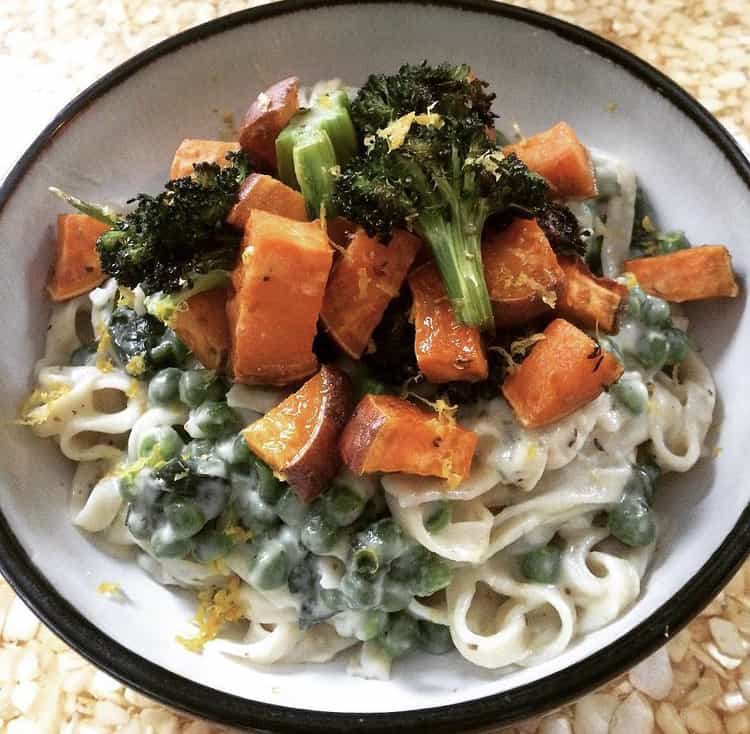
 Ananda Kaplan
Ananda Kaplan 